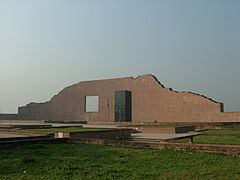Martyred Intellectuals Day (Bengali: শহীদ বুদ্ধিজীবী দিবস, romanized: Śôhīd Buddhijībī Dibôs) is observed on 14 December in Bangladesh to commemorate the large number of Bangladeshi intellectuals killed by Pakistani forces and their collaborators during the Bangladesh Liberation War, particularly on 25 March and 14 December 1971.[1][2] The killings were undertaken with the goal of annihilating the intellectual class of what was then East Pakistan. Two days after the events of 14 December on 16 December, Bangladesh became independent through the surrender of Pakistani forces.[3]
| Martyred Intellectuals Day | |
|---|---|
 | |
| Official name | Bengali: শহীদ বুদ্ধিজীবী দিবস Śôhīd Buddhijībī Dibôs |
| Observed by | Bangladesh |
| Significance | Commemoration of executions of Bengali intellectuals |
| Date | 14 December |
| Next time | 14 December 2024 |
| Frequency | Annual |
History
editThe Bangladesh Liberation War against the country West Pakistan began on 26 March 1971, grew into the Indo-Pakistani War of 1971, and ended with the victory of Bangladesh on 16 December 1971. On 14 December, sensing imminent defeat, Pakistani forces and their local collaborators— Shanti committee, Razakars, Al-Badr, and Al-Shams—abducted and killed front-line Bengali intellectuals and professionals in order to cripple the new nation intellectually.[4] Renowned academics, teachers, intellectuals, doctors, engineers, journalists, and other eminent personalities were dragged out of their houses, blindfolded, and killed. Their bodies were dumped in Rayerbazar, Mirpur, and other killing grounds in Dhaka just two days ahead of the final victory of the war.[5]
During the nine-month duration of the war, the Pakistani Army, with the assistance of local collaborators, systematically executed an estimated 991 teachers, 13 journalists, 49 physicians, 42 lawyers, and 16 writers, artists, and engineers. Even after the official ending of the war on 16 December, there were reports of killings being committed by either the armed Pakistani soldiers or by their collaborators. In one such incident, notable filmmaker Jahir Raihan was killed on 30 January 1972 in Mirpur allegedly by the armed Beharis. In memory of the people who were killed, 14 December is observed in Bangladesh as Shaheed Buddhijibi Dibôsh (Day of the Martyred Intellectuals).[6]
Notable intellectuals who were killed during the time period of 25 March to 16 December 1971 in different parts of the country include Dhaka University professors Govinda Chandra Dev (philosophy), Munier Chowdhury (Bengali literature), Mufazzal Haider Chaudhury (Bengali literature), Anwar Pasha (Bengali literature), Abul Khair (history), Jyotirmoy Guhathakurta (English literature), Humayun Kabir (English literature), Rashidul Hasan (English literature), Ghyasuddin Ahmed, Sirajul Haque Khan, Faizul Mahi, Santosh Chandra Bhattacharyya[7] and Saidul Hassan (physics), Rajshahi University professors Hobibur Rahman (mathematics), Sukhranjan Somaddar (Sanskrit), and Mir Abdul Quaiyum (psychology), as well as Mohammed Fazle Rabbee (cardiologist), AFM Alim Chowdhury (ophthalmologist), Shahidullah Kaiser (journalist), Nizamuddin Ahmed (journalist),[8] Selina Parvin (journalist), Altaf Mahmud (lyricist and musician), Dhirendranath Datta (politician), Jahir Raihan (novelist, journalist, and film director), and Ranadaprasad Saha (philanthropist).[9][10]
Memorial
editIn memory of those killed, a memorial known as the Martyred Intellectuals Memorial (Badhya Bhumi Smriti Soudha) was built at Rayer Bazaar,[11] Mohammadpur Thana in Dhaka, in 1996–99.[12] The memorial was designed by architect Farid U Ahmed and Jami Al Shafi.[13][14] The initial proposal for a memorial at Rayer Bazar was brought forward by Projonmo 71 (organisation of the children of the martyrs of liberation war), who also laid a temporary foundation stone in 1991.[citation needed]
See also
editReferences
edit- ^ Rahman, Syedur; Craig Baxter (2002). Historical Dictionary of Bangladesh. Scarecrow Press. p. 196. ISBN 978-81-7094-588-8.
- ^ Muazzam Hussain Khan (2012), "Killing of Intellectuals", in Sirajul Islam and Ahmed A. Jamal (ed.), Banglapedia: National Encyclopedia of Bangladesh (Second ed.), Asiatic Society of Bangladesh
- ^ "How Pakistan surrendered in 1971". Rediff.
- ^ "Bangladesh observes Martyred Intellectual Day". Oneindia. 14 December 2007.
- ^ "DU set to observe Martyred Intellectuals Day, Victory Day". The News Today. Retrieved 14 December 2012.
- ^ Shahiduzzaman (15 December 2005). "No count of the nation's intellectual loss". New Age. Archived from the original on 1 December 2010.
- ^ "Gallows for Mueen, Ashraf". The Daily Star. 3 November 2013.
- ^ "Story of a Martyred Intellectual of 71's war". Adnan's Den. 13 December 2007. Retrieved 10 February 2015.
- ^ "ICT issues arrest order against Mueen, Ashrafuzzaman". Daily Sun. 3 May 2013. Archived from the original on 4 November 2013. Retrieved 3 November 2013.
- ^ Khan, Tamanna (4 November 2013). "It was matricide". The Daily Star. Retrieved 7 November 2013.
- ^ Momen, Abul (2013). Meghna Guhathakurta; Willem van Schendel (eds.). The Bangladesh Reader: History, Culture, Politics. Duke University Press. p. 403. ISBN 978-0-8223-5318-8.
- ^ Ahmed, Syed Shabbir (2012). "Mohammadpur Thana (Dhaka Metropolitan)". In Islam, Sirajul; Jamal, Ahmed A. (eds.). Banglapedia: National Encyclopedia of Bangladesh (Second ed.). Asiatic Society of Bangladesh.
- ^ Amin, Md. Shahidul (2012). "Badhya Bhumi Smriti Soudha". In Islam, Sirajul; Jamal, Ahmed A. (eds.). Banglapedia: National Encyclopedia of Bangladesh (Second ed.). Asiatic Society of Bangladesh.
- ^ Zaman, Mustafa (12 December 2003). "Icons of History". Star Magazine. The Daily Star.